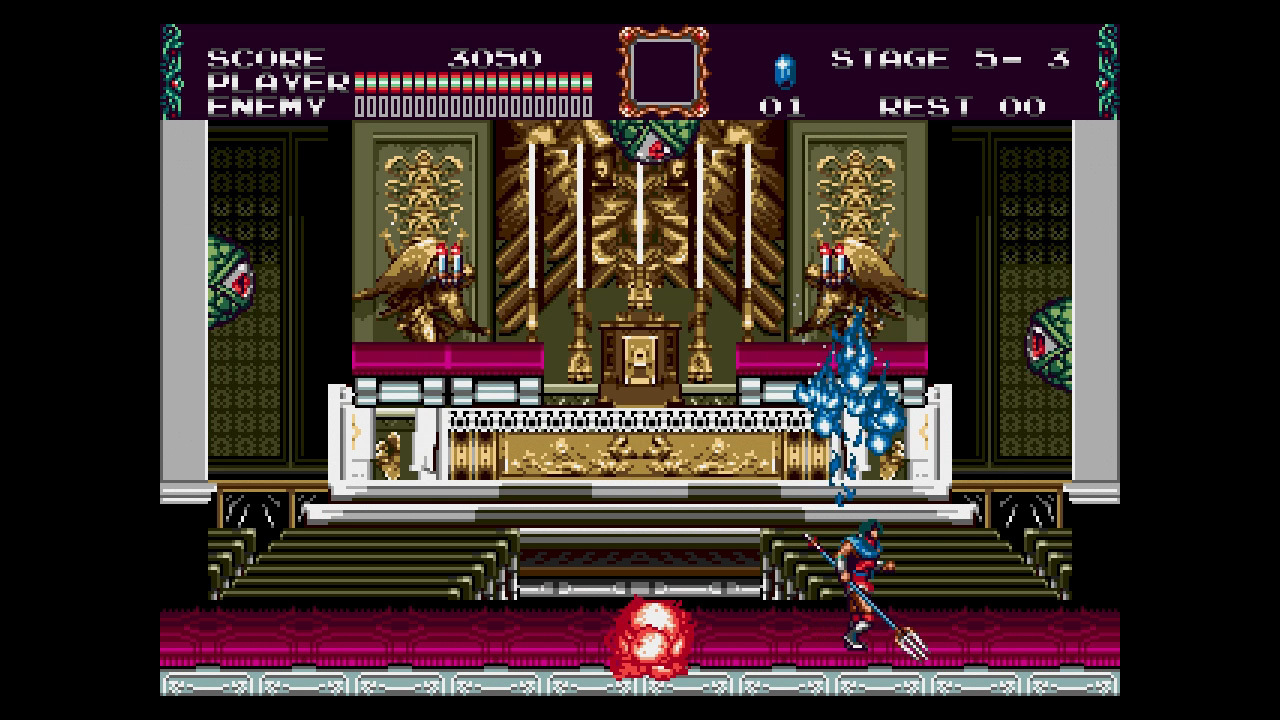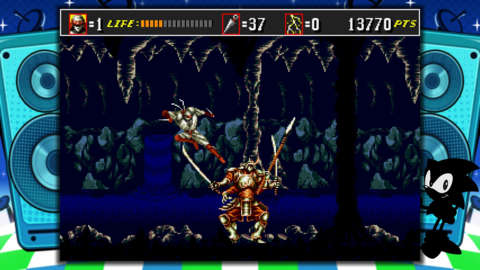Sega has done a great job of porting and packing Genesis and Mega Drive games to PC and consoles over the years, and in many cases this was with the assistance of M2, a talented team almost solely dedicated to reviving old games on modern platforms. Sega has also, more than a few times, granted publishing rights to AtGames, a company that's produced numerous aftermarket Genesis consoles (known as Mega Drive in regions outside of America) and handhelds that disappoint under scrutiny. In a bid to match Nintendo's success with the NES Classic and SNES Classic, Sega wisely bid adieu to AtGames and worked in tandem with M2 to create its own classic console, the new Genesis/Mega Drive Mini. For $80, you get a handsome little system, two controllers, and 42 games. While the Mini isn't without a few quirks, it's heads and tails above previous software-emulation-based Genesis offerings that have plagued Sega fans for years. If you want to play Genesis games but can't afford the real thing and a stack of cartridges, the Genesis Mini should be at the top of your list.
Authentic gameplay matters most when it comes to a product like this, but you shouldn't overlook the Mini's fit and finish. It bears the hallmark design of the classic Model 1 Genesis, and despite its tiny footprint--which is by some measure smaller than the included controllers--it's a mostly faithful recreation of the original hardware, down to the removable expansion port cover and cartridge slot flaps. These are frivolous cosmetic details, but they help imbue the emulator-in-a-box with a touch of material authenticity. Japanese customers even have the option to purchase mock add-ons like the Mega CD and 32X, and a hefty collection of miniature cartridges to boot--these options, unfortunately, aren't being sold in other markets. If there's one piece of the puzzle that's missing, it's the stereo headphone port on the front. While far from a deal breaker, the option would have been an awesome feature for the music lovers out there who cherish the Genesis' distinct audio profile. Otherwise, connecting the system couldn't be easier. The Mini displays at 720p over HDMI, and is powered over USB, either connected to your TV or with the included power adapter.

The pair of included three-button controllers are a spitting image of the real thing, and short of the difference in cable connections you would have a hard time telling them apart from the originals. Back in 1993, Sega eventually released six-button Genesis controllers, but like the decision to mimic the Model 1 Genesis rather than later models, Sega is likely banking on the fact that most of us identify with the original Genesis and its simpler controllers.
This decision, however, does have ramifications on the Genesis Mini experience. Of the 42 games built into the Mini, five have varying levels of support for the six-button controller. These include: Comix Zone, Eternal Champions, Shinobi 3, Street Fighter 2: Special Champion Edition, and Virtua Fighter II. While a three-button controller will be perfectly adequate for some of these, good luck playing Street Fighter 2 while having to press Start to toggle between punches and kicks. The Mini does support six-button USB controllers such as the reproductions from Retro-Bit, but it's disappointing to know that some games on the Mini will suffer unless you cough up more cash for additional controllers.
As mentioned, the Genesis/Mega Drive Mini packs a hefty allotment of games, including a few surprises.
|
|
Taste is subjective, of course, but by and large the list above is filled with classics that easily stand the test of time. Standouts classics include: Castlevania: Bloodlines, Gunstar Heroes, Shining Force, Shinobi 3, Sonic the Hedgehog 1 and 2, Streets of Rage 2, and Vectorman. There are some games on the list that are far less exciting--I'm looking at you, Light Crusader and Virtua Fighter 2--but you'd be hard pressed to grow tired of the selection here if you have a taste for 16-bit gaming.
There are also a few other games that deserve special mention, either for having never been released in the US, or, for having never been released on the Genesis at all. Games like Mega Man Wily Wars and Monster World IV are two games that never made it to retail shelves in North America, and both are delightful side-scrollers that are great to have on hand. It's even worth calling out the inclusion of Tetris, which while not an astounding port by any means, is an incredible rare game in the real world--only a handful of copies exist of the Japanese version after production was halted and games were destroyed following a lawsuit back in the day.
The Complete FALLOUT Timeline Explained! Warhammer 40k: Darktide - Path of Redemption | Update Trailer Is Fallout 76 Good in 2024? SAND LAND - Official Darude Sandstorm Trailer No Rest for the Wicked - Official Steam Early Access Launch Trailer Battlefield 2042 | Frontlines Mode Returns - Time-Limited Event Trailer 21 Details You May Have Missed In Helldivers 2 Stellar Blade - Official "The Journey" Behind The Scenes Trailer | PS5 Games Zenless Zone Zero - Official Koleda Character Teaser Trailer | "Bite At The Site" PUBG MOBILE | SPYxFAMILY Collaboration LIVE Now! Genshin Impact | Version 4.6 "Two Worlds Aflame, the Crimson Night Fades" Trailer The 11 Creepiest Vaults Of Fallout
Please enter your date of birth to view this video
By clicking 'enter', you agree to GameSpot's
Terms of Use and Privacy Policy
The real highlight for hardcore retro game fans is Darius MD. Darius is a side-scrolling shooter series from Taito that has seen many games on many platforms, including Darius 2 on the Mega Drive. The original Darius, however, only exists as it does on the Genesis because a hobbyist developer in Japan created his own port over the past few years, and wisely, M2 decided to team up with him and polish it for release on the Genesis Mini. It's a solid game, and an awesome tip of the hat to classic gaming fans.
Just as important as the selection of games is the quality of the emulation, and the Genesis Mini blows past efforts from AtGames out of the water. By and large, games look and sound amazing, without any of the tinny audio funk that usually plagues aftermarket Genesis consoles. If you want to dig into the finest of details, as the meticulous duo My Life In Gaming has, there are aspects of the Mini that aren't entirely accurate--such as uneven pixel sizing in games that are natively designed for the Genesis' alternative display resolutions--though in practice, this particular issue isn't egregious enough to ruin the gameplay experience. It is, however, somewhat unlike M2 to leave an issue like this unresolved.

Likewise, the Mini lacks M2's usual depth of options and special features, leaving you with basic video settings like screen stretching, CRT filtering and wallpaper options. Though to be fair, the basics are certainly good enough. The Genesis Mini does have one cool feature under its sleeve, however, that may not be apparent at first glance: the ability to play alternate versions of games by changing the language settings in the system menu. Changing the language to Japanese, for example, will cause the menu to populate with Japanese cover art, and the games themselves will reflect the ROM from that version of the game. This won't be to everyone's benefit as the difference between regions is relatively minor for most games, but it's certainly neat to have the option of converting Robotnik's Mean Bean machine to Puyo Puyo, for example. If there's one critique to lay on this option: burying these alternate releases under language settings is unintuitive and not something most people will want to do, as the conversion of menu text to other languages will make it tough to revert back to your preferred region.
So the Mini has some issues, and for M2 fans it might be a little disappointing to see that it falls short of the team's most ambitious retro projects from the past, but for the most part the Mini is a very satisfying little console. It's got the looks, it's got a great selection of games that largely play faithful to the original experience, and it's priced just right at $80--though you may disagree if the six-button games like Street Fighter II are critical factors. Genesis fans have waited a long time for a system like this, and for once, we're happy to say that the latest official Genesis console is one worth buying.











